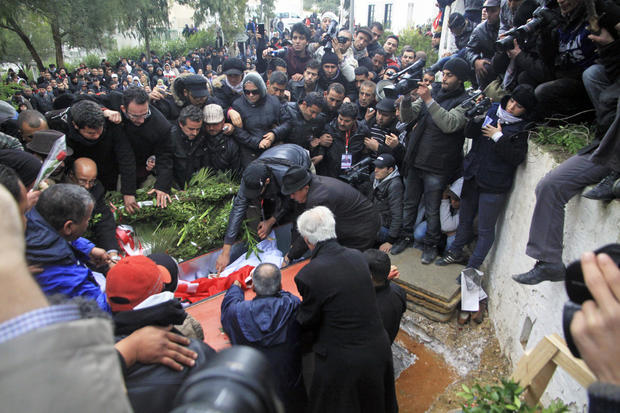Slain Tunisian leader's funeral marred by clashes
TUNIS, Tunisia The funeral of a slain Tunisian opposition leader was marred Friday by clashes between police and gangs of young men destroying nearby cars, as black smoke spiraled from burning vehicles into the sky and clouds of tear gas floated over the nearby cemetery.
Hundreds of thousands of Tunisians chanting anti-government slogans converged on the Jellaz cemetery for the funeral of Chokri Belaid, a left-wing politician whose assassination Wednesday outside his home has exacerbated Tunisia's political crisis and escalated tensions in the North African nation that helped kick off the Arab Spring.
The murder of Belaid, a harsh critic of the Islamist government, sparked days of rioting by his supporters, who hold the ruling Ennahda party complicit in his death. The nation was largely shut down Friday due to a general strike called by the labor unions in solidarity, and the national carrier Tunis Air canceled all its flights.
Belaid's funeral procession passed into the cemetery amid a scene of chaos caught live on television.
Family members and associates wept as he was lowered into the earth and his colleague Hamma Hammami of the Tunisian Workers' Party gave the eulogy.
"Sleep well, Chokri, we will continue the fight," he said, even as the acrid stench of the tear gas fired outside hung in the air.
Hundreds of young men threw rocks at police trying to stop them from destroying cars in a nearby municipal lot, and police responded with tear gas. TV images showed the youths pushing cars into the street, and the cars bursting into flame.
Witnesses described the young men in tracksuits -- many armed with clubs and machetes -- as hooligans seeking to take advantage of the turmoil surrounding the funeral.
"These kids are uncontrollable and don't follow any political ideology," said Moncef Chebbi, 68, a retired computer programmer attending the funeral. He said they came from nearby low-income neighborhood. "This is very disappointing, it's a shame."
Khaled Tarrouch, the Interior Ministry spokesman, said 132 people were arrested and around a dozen cars set on fire. He said they were being questioned to see if someone was behind the violence.
There were demonstrations and symbolic funerals held for Belaid in several cities around the country.
Once the standard bearer in the region for its political consensus, the Tunisia's transition to democracy since the 2011 ouster of dictator Zine El Abidine Ben Ali has been shaken by a sour economy and political turmoil pitting the country's governing Islamists against secular parties, sometimes violently.
Efforts to stem the country's worst crisis since the revolution have so far failed and the anti-government sentiment at the cemetery was palpable. Before the body arrived, there was a brief scuffle when officials identified as being with the governing coalition were stopped by the crowd from entering.
The army, one of the few state institutions still holding people's respect, provided security for the funeral march and could play the role of a stabilizing force in the coming weeks.
Belaid had accused the Ennahda party of resorting to thugs to attack opposition rallies. His family and allies accuse the party of complicity in his murder. Although they have offered no proof, the allegations have fanned popular dissatisfaction with the government.
"We can't accept that they assassinate freedom, that they assassinate democracy -- that's what they are doing -- we are burying a martyr," said Mohammed Souissi, a 63-year-old veterinarian who showed up at the cemetery, where the crowd seemed unfazed by the intermittent rain and sang the national anthem and chanted "Ghannouchi assassin," a reference to Rachid Ghannouchi, the head of Ennahda.
- Tunisia opposition leader, Chokri Belaid, a critic of the Islamist-led, post-Arab Spring gov't, shot dead
- Benghazi suspect Ali Harzi released by Tunisia for lack of evidence, lawyer says
Near Belaid's parental home where the funeral procession began, opposition politicians, lawyers in black robes and white collars gathered with thousands of other mourners, chanting "stop the violence" and "we are all Chokri Belaid."
More than a dozen headquarters of the Ennahda party were attacked overnight in towns around the country, Tunisian media reported. Schools, shops, banks and other institutions were all shuttered following the general strike.
Tunisia's prime minister offered to replace the government after Belaid's killing in response to long standing opposition demands, but that attempt may have backfired as Ennahda rejected his decision -- exposing divisions within the party itself between moderates and hardliners.
The Ministry of the Interior put out a statement Friday urging calm, but the police force has been a major target of protesters over the past few days. The ministry building itself on Friday morning was ringed by several lawyers of iron barriers and barbed wire extending across the city's signature Bourguiba Avenue. The area was also heavily patrolled by armored police vehicles in anticipation of any violence.
Belaid's death came as relations between the government and the opposition had deteriorated. Ennahda was long repressed under the secular rule of Ben Ali, but after his overthrow, the well-organized movement won subsequent elections. Overall, Ennahda is considered a moderate grouping. Hardline Islamists known as Salafis have come out against it.
Friday's strike was called by the country's largest labor union, the General Union of Tunisian Workers, in a clear expression of their opposition to the Ennahda government. A threat to call a general strike in December was defused by negotiations.
As one of the most organized groups in society and with a left-wing leadership, the UGTT, as it is known, has long been a counterbalance to Ennahda. The last time it called a general strike, in 1978, riots erupted around the country.
